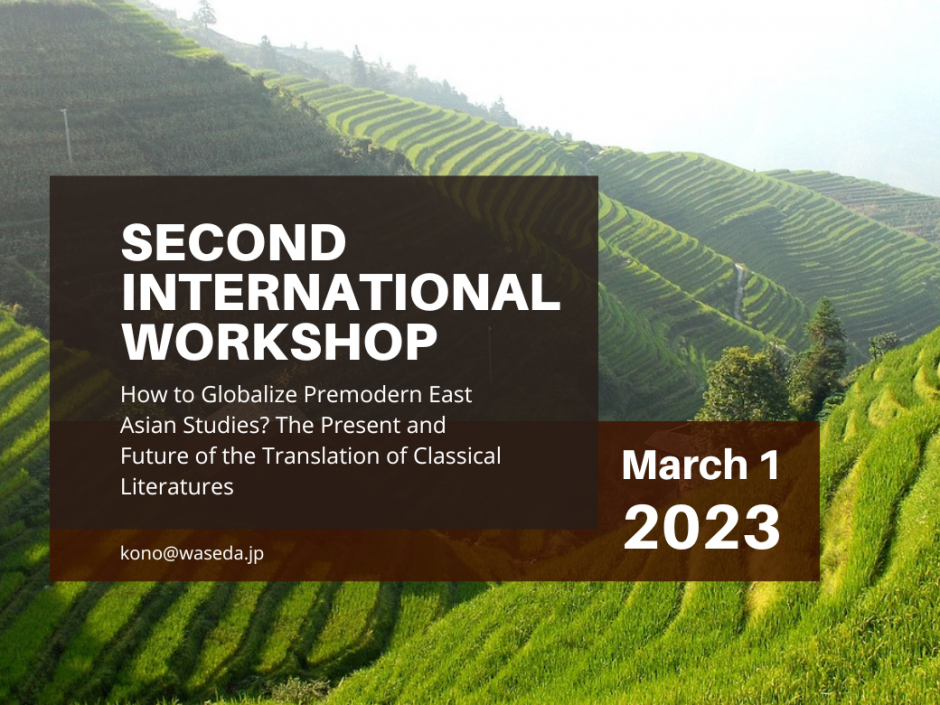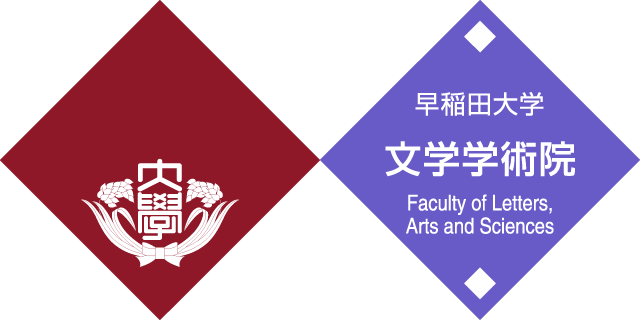- News
- Event Report: ”SECOND INTERNATIONAL WORKSHOP: How to Globalize Premodern East Asian Studies? The Present and Future of the Translation of Classical Literatures”
Event Report: ”SECOND INTERNATIONAL WORKSHOP: How to Globalize Premodern East Asian Studies? The Present and Future of the Translation of Classical Literatures”

- Posted
- Mon, 03 Apr 2023
On Wednesday, March 1, 2023, “SECOND INTERNATIONAL WORKSHOP: How to Globalize Premodern East Asian Studies? The Present and Future of the Translation of Classical Literatures” was held at Room 232, Building 33, Toyama Campus, Waseda University (High-flex system for some speakers only). The workshop was co-hosted by Professor Kimiko Kono (Waseda University, Faculty of Letters) and Professor Wiebke Denecke (Massachusetts Institute of Technology, School of Humanities, Arts and Social Sciences).

Professor Kimiko Kono began by explaining the background and topics of the workshop; following last year’s workshop on Chinese, Korean, and English translations of A New History of Japanese “Letterature”, this year’s workshop aimed to introduce and report on new insights and challenges that surfaced during the preparation of the Chinese and Korean translations, to explore the problems of translating the classics into modern languages, and the MIT-led ongoing project to translate East Asia’s classical Sinitic lliteratures into English, and to discuss the globalization of East Asian classical studies. Professor Wiebke Denecke then explained the vision and goals of the workshop, including the lack of supporting institutions and quality translations of East Asian classics, and the need for sufficient discussion on translation and translation into modern East Asian languages in order to inspire new literature in the future.

The workshop featured reports on six topics.
The first report was by Xu Mengzhou and Zeng Yanjie of the Graduate School of Tsinghua University, who are involved in the translation of A New History of Japanese “Letterature” into Chinese. Xu discussed how to translate Japanese-Chinese homographs, and Zeng discussed and presented his findings through translation practice on how to translate proper nouns, academic terms, and quotations.
In Report 2, Professor Noh Johann of Korea University, who is involved in the translation of A New History of Japanese “Letterature” into Korean, discussed the characteristics of the book from a translator’s point of view.
In Report 3, Professor Sim Kyungho and Associate Professor Yang Wonsuk of Korea University reported on the status, support system, and future goals of translating Korean Chinese writings into modern Korean. Specifically, they detailed the efforts of research institutions promoting translation projects in Korea, such as the Society for the Study of Traditional Culture, the Korea Research Foundation, and the Korean Classics Translation Institute, and presented their achievements and challenges based on solid data.
In Report 4, Yue Qu, a lecturer at Beijing Normal University, presented a summary of the situation of translations of Japanese kanbun literature into modern Japanese, which has yet to be examined in its entirety. He also suggested that a comprehensive catalog should be compiled in the future.

In Report 5, Jiang Yiqiao, an invited researcher of the Research Institute of Japanese Classical Books, Waseda University, listed previously published works on the translation of Japanese classical literature into Chinese, and stated that China does not currently have an adequate system to support the translation of Japanese and other foreign works, and that the translator’s native language level is required when translating.
Finally, in Report 6, Professor Wiebke Denecke of MIT presented the vision and significance of the Hsu-Tang Library of Classical Chinese Literature, a bilingual (Chinese-English) translation series of three millennia of literary heritage of East Asia written in Literary Chinese which has been endowed in perpetuum thanks to a large gift from Oscar Tang and Agnes Hsu-Tang and will launch its first volumes this fall. Aiming to publish scholarly, yet also eminently readable translations, this translation series will be a formidable platform to bring East Asia’s literatures in Literary Chinese to audiences around the world in print and online.
Following these reports, Professor Juan Xueyan of Tsinghua University, the coordinator of the project to translate A New History of Japanese “Letterature” into Chinese, gave her comments, which were followed by a lively Q&A session among the speakers and with the audience. The workshop closed with a number of suggestions shared by the participants, such as the fact that the choice of which work to translate involves a variety of criteria, and that translation should be done while preserving the complexity of the classics.

The workshop was organized by the Research Institute of Japanese Classical Books, Waseda University, and the Global Japanese Studies Model Unit, Waseda University Top Global University Project, and co-organized by MIT School of Humanities, Arts, and Social Sciences, Ryusaku Tsunoda Center of Japanese Culture, and Grant-in-Aid for Scientific Research (C) (20K00337).
(Written by Kimiko Kono)
Participant’s Impression
“Korean literature in Literary Chinese” came up in the workshop, and I would really love to read some of it. (This may make the impact on the Japanese language more apparent.) The idea of establishing the Hsu-Tang Library of Classical Chinese Literature was wonderful. (Noriko Takahashi)
As in the previous workshop, I learned about the challenges of translation from various perspectives of those involved in the translation process. I was reminded of the problems of translation, such as the conversion of homonyms and word order, and the need for proper translation, and the fact that translators are required to have high skills in the target language, as more and more books with a fluent style are now being read. And some, such as Hsu-Tang Library of Classical Chinese Literature, dared to pick up parody works for translation rather than only so-called “canonical” works, and there are plans to translate the entire Zizhi Tongjian, which is expected to span generations. In contrast, many researchers have voiced their opinions that they cannot make a living by translating and that translation is not an achievement, making me keenly aware of the need to reevaluate classical translations and the importance of translation. (Feng Chencheng)
This workshop began with a discussion of the problems and practices involved in translating A New History of Japanese “Letterature” into Chinese and Korean, as well as specific examples of both, and provided an insight into the ingenuity of translating an academic text with both precision and richness of expression, especially how to accurately translate the Japanese word “ba (place)”. In addition, the presentations by the professors provided me with information on the current status of the organization and the texts it handles in the Sinographic sphere, as well as issues that need to be improved. I learned about issues ranging from abstract concepts to concrete measures, including translation for researchers, translation for the general public, translation of literary works and academic works, and the question of the treatment of translators. (Zhu Yimai)
Event Overview
- Date and time: March 1, 2023, 9:50 – 12:40 (JST)
- Language: Japanese
- Venue: Room 232, Building 33, Toyama Campus, Waseda University
- Participation is free.
- Organized by: Research Institute of Japanese Classical Books, Global Japanese Studies Model Unit, Waseda University Top Global University Project
- Co-organized by: MIT School of Humanities, Arts, and Social Sciences, Ryusaku Tsunoda Center of Japanese Culture, Grant-in-Aid for Scientific Research (C) (20K00337)
- Prospected Audience: Faculty members, Researchers, Graduate students
- Tags
- Event Reports
